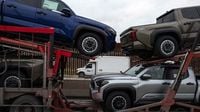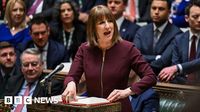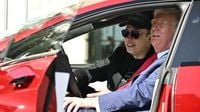Elon Musk has warned that Tesla will not escape the impact of sweeping new US auto tariffs, but the electric car maker could still gain a competitive edge over its rivals. On Wednesday, Donald Trump announced a 25 percent tariff on all non-US-made vehicles and parts, set to take effect on April 2, 2025. The move, aimed at protecting American manufacturers, is expected to disrupt supply chains, drive up production costs, and raise car prices across the board.
However, Tesla’s reliance on America-based production could shield it from the worst of the fallout. The company manufactures all the cars it sells in the US at its factories in California and Texas, meaning its vehicles will be exempt from the new tariffs. While Tesla will still face higher costs due to levies on imported motors, batteries, and raw materials, its US production offers a significant advantage over competitors with heavier exposure to foreign manufacturing.
“Important to note that Tesla is NOT unscathed here. The tariff impact on Tesla is still significant,” Musk posted on X, which he owns.
Tesla’s rivals are bracing for a more severe fallout. Volkswagen, one of the most exposed automakers, produces some vehicles in Tennessee. However, it relies heavily on Mexican factories for models such as the Jetta. Its Audi division also imports vehicles from Mexico and Europe, which will now face steep tariffs. Hyundai and Toyota, both of which ship hundreds of thousands of cars from Asia to the US each year, will be hit particularly hard. Meanwhile, Ford, which builds its popular F-series pickups at several US manufacturing sites, could gain a similar advantage to Tesla over General Motors, which manufactures many of their trucks in Mexico. Although Tesla imports some parts, its rivals’ greater dependence on foreign production makes them more vulnerable to rising costs.
Trump insisted on Wednesday that Musk had no influence over the tariff decision, but the two have a history of mutual admiration. “He’s never asked me for a favour in business whatsoever,” Trump said at the White House. Just last week, the president was outside the White House admiring a row of five Teslas parked in front of the press, reeling off their prices like an auctioneer. “That’s beautiful… that one,” Trump said. “I’ll give him a cheque. I do it the old-fashioned way… and I don’t want a discount.”
Musk’s Tesla is no stranger to government handouts. Tesla has long benefited from government support, receiving $11.4 billion in regulatory credits through federal and state programmes designed to promote electric vehicle (EV) production, according to The Washington Post. Under Trump’s administration, Tesla may also gain from a potential $400 million government contract to supply armoured electric vehicles for US diplomats.
While Tesla may gain a competitive advantage via the tariffs, the broader auto industry is bracing for higher costs. Tariffs on vehicles and parts will increase production expenses, possibly forcing automakers to raise prices worldwide. Analysts estimate that new car prices could rise by thousands of dollars, making vehicles unaffordable for many Americans. In the EV sector, Tesla could become a more attractive option compared with foreign-made rivals such as BMW and Hyundai, whose models will now carry heftier tariffs due to importing more parts from outside the US.
However, outside the US, Tesla’s outlook appears far less certain. Musk’s increasingly recent far-right pivot and infamous Nazi salute have damaged the brand’s reputation in Europe. In Germany, Tesla sales have plunged by 70 percent in recent months, while the company faces growing protests abroad, and cars have been torched as anger mounts against Musk’s antics. Retaliatory tariffs from other nations are also expected, adding further pressure on Tesla. Although Tesla may gain a competitive advantage with sales in the US, it faces mounting challenges globally. With its stock continuing to tumble, Musk’s own erratic behaviour risks becoming the company’s biggest liability.
Meanwhile, taxes may have to rise in the autumn, economists have warned, despite big benefit cuts and spending reductions in Wednesday's Spring Statement. The Institute for Fiscal Studies think tank said Chancellor Rachel Reeves's headroom to deal with economic risks, like Donald Trump's tariffs, was "very small". Director Paul Johnson said there was a "good chance" economic forecasts would deteriorate significantly before October's Budget, "which will likely mean raising taxes even further".
Prime Minister Sir Keir Starmer did not rule out further tax rises in the autumn but pointed out the government had resisted doing so in its Spring Statement. "Obviously, I'm not going to write future budgets - every prime minister and chancellor from every government always takes that position," he told reporters. "But if you look at the pattern, if you like, or the intent for both the Budget and the Spring Statement, you'll see that when it comes to the decisions we've had to make, we have not taken the decision to increase tax, and I think that indicates the mindset that we bring to this."
In its election manifesto, Labour promised not to increase taxes on "working people", covering National Insurance, Income Tax, and VAT. However, in last autumn's Budget, the government increased National Insurance contributions for employers, saying the hike was needed to plug a "black hole" in the nation's finances and invest in the NHS and other public services. Overnight, Trump announced new tariffs - or import taxes - of 25% on cars and car parts coming into the US from April 2.
The UK has already been hit by 25% tariffs on steel and aluminium exported to the US. Meanwhile, Trump has promised a raft of further tariffs from April 2. Reeves told the BBC the UK is in "intensive negotiations" with the US to carve out a deal to avoid tariffs. However, the prospect of a global trade war still threatens to wipe out the headroom in the country's finances. Mr Johnson said Trump's announcement overnight demonstrated "we live in a risky and changing world".
"There is a good chance that economic and fiscal forecasts will deteriorate significantly between now and an autumn Budget," he said. "If so, she will need to come back for more; which will likely mean raising taxes even further." He added that "months of speculation" over which taxes might rise could have "damaging" political and economic consequences.
Asked on Wednesday if there could be more tax rises in October, Reeves said: "We'll never have to do a Budget like that again." Pressed on BBC Radio 4's Today programme over whether if things went wrong there may need to be more tax rises or spending cuts, the chancellor acknowledged "there's always risks" but said there were also "opportunities" for economic growth from housebuilding and reforms to the planning system.
The government's independent spending watchdog, the Office for Budget Responsibility (OBR), halved its growth forecast for the UK this year to 1%, down from its October prediction of 2%. But in subsequent years, the OBR predicted growth would be higher than expected thanks, in part, to more housebuilding.
The chancellor has insisted she will stick to her self-imposed "fiscal rules" - designed to reassure financial markets. The two key ones are not to borrow to fund day-to-day public spending and to get government debt falling as a share of national income by the end of this parliament. The chancellor said changes in the global economy meant she would have missed her rule on spending by £4.1 billion due to an increase in government borrowing costs. She said measures announced on Wednesday "restored in full our headroom" to £9.9 billion. But OBR chairman Richard Hughes warned that if the US levied tariffs of 20% on imports, and the UK and the rest of the world retaliated with the same, this could "wipe out" the chancellor's headroom.






